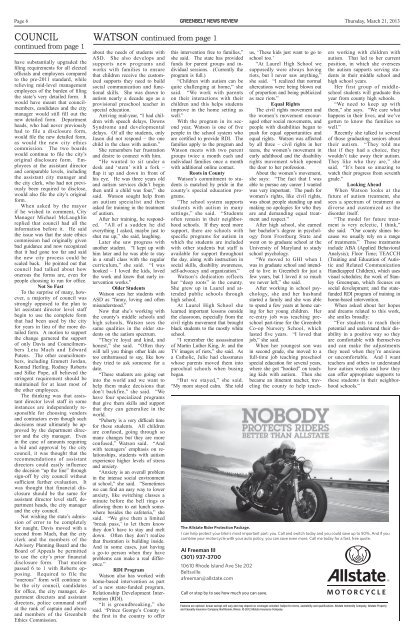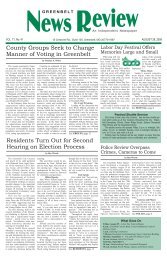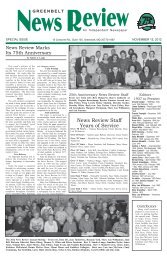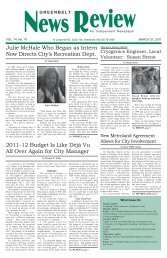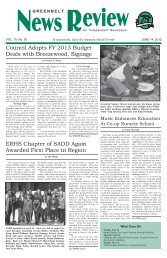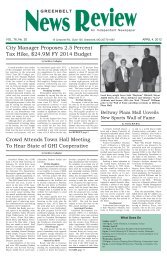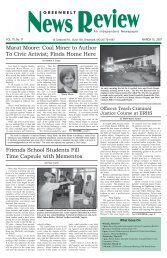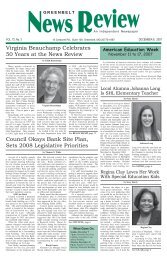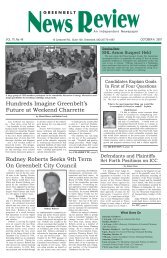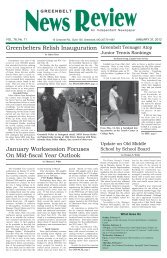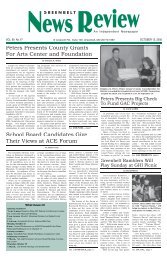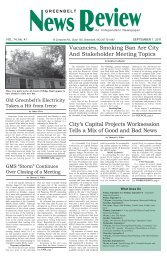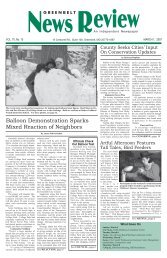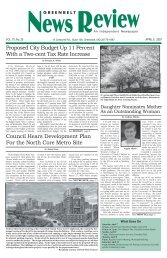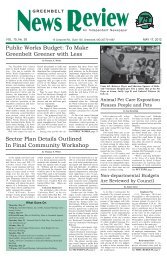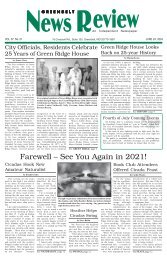March 21 - Greenbelt News Review
March 21 - Greenbelt News Review
March 21 - Greenbelt News Review
You also want an ePaper? Increase the reach of your titles
YUMPU automatically turns print PDFs into web optimized ePapers that Google loves.
Page 6 GREENBELT NEWS REVIEW Thursday, <strong>March</strong> <strong>21</strong>, 2013<br />
COUNCIL<br />
continued from page 1<br />
have substantially upgraded the<br />
filing requirements for all elected<br />
officials and employees compared<br />
to the pre-2011 standard, while<br />
relieving mid-level management<br />
employees of the burden of filing<br />
the state’s very detailed form. It<br />
would have meant that councilmembers,<br />
candidates and the city<br />
manager would still fill out the<br />
new detailed form. Department<br />
heads, who had never previously<br />
had to file a disclosure form,<br />
would file the new detailed form,<br />
as would the new city ethics<br />
commission. The two boards<br />
would continue to file the city’s<br />
original disclosure form. Employees<br />
at the assistant director<br />
and comparable levels, including<br />
the assistant city manager and<br />
the city clerk, who had not previously<br />
been required to disclose,<br />
would also file the city’s original<br />
form.<br />
When asked by the mayor<br />
if he wished to comment, City<br />
Manager Michael McLaughlin<br />
replied that council had all the<br />
information before it. He said<br />
the issue was that the state ethics<br />
commission had originally given<br />
bad guidance and now recognized<br />
that it had gone too far and said<br />
the new city process could be<br />
scaled back. He pointed out that<br />
council had talked about how<br />
onerous the forms are, even for<br />
people choosing to run for office.<br />
Not So Fast<br />
To the surprise of many, however,<br />
a majority of council was<br />
strongly opposed to the plan to<br />
let assistant director level staff<br />
begin to use the complete form<br />
that had been used by the city<br />
for years in lieu of the more detailed<br />
form. A motion to support<br />
the change garnered the support<br />
of only Davis and Councilmembers<br />
Leta Mach and Edward<br />
Putens. The other councilmembers,<br />
including Emmett Jordan,<br />
Konrad Herling, Rodney Roberts<br />
and Silke Pope, all believed the<br />
stringent requirement should be<br />
maintained for at least most of<br />
the other employees.<br />
The thinking was that assistant<br />
director level staff in some<br />
instances are independently responsible<br />
for choosing vendors<br />
and contractors even though such<br />
decisions must ultimately be approved<br />
by the department director<br />
and the city manager. Even<br />
in the case of amounts requiring<br />
a bid and approval by the city<br />
council, it was thought that the<br />
recommendations of assistant<br />
directors could easily influence<br />
the decision “up the line” through<br />
sign-off by city council without<br />
sufficient further evaluation. It<br />
was thought that financial disclosure<br />
should be the same for<br />
assistant director level staff, department<br />
heads, the city manager<br />
and the city council.<br />
Not wishing the state’s admission<br />
of error to be completely<br />
for naught, Davis moved with a<br />
second from Mach, that the city<br />
clerk and the members of the<br />
Advisory Planning Board and the<br />
Board of Appeals be permitted<br />
to use the city’s prior financial<br />
disclosure form. That motion<br />
passed 6 to 1 with Roberts opposing.<br />
Required to file the<br />
“onerous” form will continue to<br />
be the city council, candidates<br />
for office, the city manager, department<br />
directors and assistant<br />
directors, police command staff<br />
at the rank of captain and above<br />
and members of the <strong>Greenbelt</strong><br />
Ethics Commission.<br />
WATSON continued from page 1<br />
about the needs of students with<br />
ASD. She also develops and<br />
supports new programs and<br />
works with families to ensure<br />
that children receive the customized<br />
supports they need to build<br />
social communication and functional<br />
skills. She was drawn to<br />
autism nearly a decade ago as a<br />
provisional preschool teacher in<br />
special education.<br />
Arriving mid-year, “I had children<br />
with speech delays, Downs<br />
Syndrome and developmental<br />
delays. Of all the students, only<br />
Jason did not respond – the one<br />
child in the class with autism.”<br />
She remembers her frustration<br />
and desire to connect with him.<br />
“He wanted to sit under a<br />
desk and ‘stem’ with a fork –<br />
flap it up and down in front of<br />
his eye. He was three years old<br />
and autism services didn’t begin<br />
then until a child was four,” she<br />
said. Watson sought help from<br />
an autism specialist and then<br />
asked for training in the treatment<br />
of autism.<br />
After her training, he responded.<br />
“All of a sudden he did<br />
everything I asked, maybe just to<br />
shut me up,” she said, laughing.<br />
Later she saw progress with<br />
another student. “I kept up with<br />
him later and he was able to stay<br />
in a small class with the regular<br />
curriculum,” she said. “I was<br />
hooked – I loved the kids, loved<br />
the work and knew that early intervention<br />
works.”<br />
Older Students<br />
Watson sees her students with<br />
ASD as “funny, loving and often<br />
misunderstood.”<br />
Now that she’s working with<br />
the county’s middle schools and<br />
high schools, Watson sees the<br />
same qualities in the older students<br />
on the autism spectrum.<br />
“They’re loyal and kind, and<br />
honest,” she said. “Often they<br />
will tell you things other kids are<br />
too embarrassed to say, like how<br />
they tried to ask someone for a<br />
date.<br />
“These students are going out<br />
into the world and we want to<br />
help them make decisions that<br />
don’t backfire,” she said. “We<br />
have four specialized programs<br />
that give them skills and support<br />
that they can generalize in the<br />
world.<br />
“Puberty is a very difficult time<br />
for these students. All children<br />
are confused, going through so<br />
many changes but they are more<br />
confused,” Watson said. “And<br />
with teenagers’ emphasis on relationships,<br />
students with autism<br />
experience higher levels of stress<br />
and anxiety.<br />
“Anxiety is an overall problem<br />
in the intense social environment<br />
at school,” she said. “Sometimes<br />
we can find an easy way to lower<br />
anxiety, like switching classes a<br />
minute before the bell rings or<br />
allowing them to eat lunch somewhere<br />
besides the cafeteria,” she<br />
said. “We give them a limited<br />
‘break pass,’ to let them know<br />
they don’t have to stay and melt<br />
down. Often they don’t realize<br />
that frustration is building inside.<br />
And in some cases, just having<br />
a go-to person when they have<br />
problems can make a real difference.”<br />
RDI Program<br />
Watson also has worked with<br />
home-based intervention as part<br />
of a new state-funded program,<br />
Relationship Development Intervention<br />
(RDI).<br />
“It is groundbreaking,” she<br />
said. “Prince George’s County is<br />
the first in the country to offer<br />
this intervention free to families,”<br />
she said. The state has provided<br />
funds for parent groups and individual<br />
sessions. (Currently the<br />
program is full.)<br />
“Children with autism can be<br />
quite challenging at home,” she<br />
said. “We work with parents<br />
on their interactions with their<br />
children and this helps students<br />
improve in the home setting as<br />
well.”<br />
With the program in its second<br />
year, Watson is one of five<br />
people in the school system who<br />
are certified to provide RDI. The<br />
families apply to the program and<br />
Watson meets with two parent<br />
groups twice a month each and<br />
individual families once a month<br />
with additional online contact.<br />
Roots in County<br />
Watson’s commitment to students<br />
is matched by pride in the<br />
county’s special education programs.<br />
“The school system supports<br />
students with autism in many<br />
settings,” she said. “Students<br />
often remain in their neighborhood<br />
schools. If they need more<br />
support, there are schools with<br />
specific programs for autism in<br />
which the students are included<br />
with other students but staff is<br />
available for support throughout<br />
the day, along with instruction in<br />
social skills, disability awareness,<br />
self-advocacy and organization.”<br />
Watson’s dedication reflects<br />
her “deep roots” in the county.<br />
She grew up in Laurel and attended<br />
public schools through<br />
high school.<br />
At Laurel High School she<br />
learned important lessons outside<br />
the classroom, especially from the<br />
civil rights movement that brought<br />
black students to the mostly white<br />
school.<br />
“I remember the assassination<br />
of Martin Luther King, Jr. and the<br />
TV images of riots,” she said. As<br />
a Catholic, Julie had classmates<br />
whose parents moved them into<br />
parochial schools when busing<br />
began.<br />
“But we stayed,” she said.<br />
“My mom stayed calm. She told<br />
The Allstate Rider Protection Package.<br />
I can help protect your bike’s most important part: you. Call and switch today and you could save up to 50%. And if you<br />
combine your motorcycle with your auto policy, you can save even more. Call me today for a fast, free quote.<br />
Al Freeman III<br />
(301) 937-3700<br />
10610 Rhode Island Ave Ste 202<br />
Beltsville<br />
afreeman@allstate.com<br />
Call or stop by to see how much you can save.<br />
us, ‘These kids just want to go to<br />
school too.’<br />
“At Laurel High School we<br />
supposedly were always having<br />
riots, but I never saw anything,”<br />
she said. “I realized that normal<br />
altercations were being blown out<br />
of proportion and being publicized<br />
as race riots.”<br />
Equal Rights<br />
The civil rights movement and<br />
the women’s movement encouraged<br />
other social movements, and<br />
people with disabilities began to<br />
push for equal opportunities and<br />
equal rights. Watson was affected<br />
by all three – civil rights in her<br />
teens, the women’s movement in<br />
early adulthood and the disability<br />
rights movement which opened<br />
the door to her profession.<br />
About the women’s movement,<br />
she says: “The fact that I was<br />
able to pursue any career I wanted<br />
was very important. The push for<br />
women’s rights, like civil rights,<br />
was about people standing up and<br />
making no apologies for who they<br />
are and demanding equal treatment<br />
and respect.”<br />
After high school, she earned<br />
her bachelor’s degree in psychology<br />
from Frostburg State and<br />
went on to graduate school at the<br />
University of Maryland to study<br />
school psychology.<br />
“We moved to GHI when I<br />
was in graduate school and intended<br />
to live in <strong>Greenbelt</strong> for just a<br />
few years, but I loved it so much<br />
we never left,” she said.<br />
After working in school psychology,<br />
she and her husband<br />
started a family and she was able<br />
to spend a few years at home caring<br />
for her young children. Her<br />
re-entry job was teaching preschool<br />
part-time for the <strong>Greenbelt</strong><br />
Co-op Nursery School, which<br />
lasted five years. “I loved that<br />
job,” she said.<br />
When her youngest son was<br />
in second grade, she moved to a<br />
full-time job teaching preschool<br />
special education for several years,<br />
where she got “hooked” on teaching<br />
kids with autism. Then she<br />
became an itinerant teacher, traveling<br />
the county to help teachers<br />
working with children with<br />
autism. That led to her current<br />
position, in which she oversees<br />
the autism supports serving students<br />
in their middle school and<br />
high school years.<br />
Her first group of middleschool<br />
students will graduate this<br />
year from county high schools.<br />
“We need to keep up with<br />
them,” she says. “We care what<br />
happens in their lives, and we’ve<br />
gotten to know the families so<br />
well.”<br />
Recently she talked to several<br />
of those graduating seniors about<br />
their autism. “They told me<br />
that if they had a choice, they<br />
wouldn’t take away their autism.<br />
They like who they are,” she<br />
said. “It’s been so amazing to<br />
watch their progress from seventh<br />
grade.”<br />
Looking Ahead<br />
When Watson looks at the<br />
future of autism treatment, she<br />
sees a spectrum of treatment as<br />
diverse and customized as the<br />
disorder itself.<br />
“The model for future treatment<br />
is very eclectic, I think,”<br />
she said. “Our county shines because<br />
we usually rely on a range<br />
of treatments.” Those treatments<br />
include ABA (Applied Behavioral<br />
Analysis); Floor Time; TEACCH<br />
(Training and Education of Autistic<br />
and Related Communication<br />
Handicapped Children), which uses<br />
visual schedules; the work of Stanley<br />
Greenspan, which focuses on<br />
social development; and the statefunded<br />
RDI program of training in<br />
home-based intervention.<br />
When asked about her hopes<br />
and dreams related to this work,<br />
she smiles broadly:<br />
“For students to reach their<br />
potential and understand their disability<br />
in a positive way so they<br />
are comfortable with themselves<br />
and can make the adjustments<br />
they need when they’re anxious<br />
or uncomfortable. And I want<br />
teachers and others to understand<br />
how autism works and how they<br />
can offer appropriate supports to<br />
these students in their neighborhood<br />
schools.”<br />
Features are optional. Actual savings will vary and may depend on coverages selected. Subject to terms, availability and qualifications. Allstate Indemnity Company, Allstate Property<br />
and Casualty Insurance Company: Northbrook, Illinois © 2012 Allstate Insurance Company.


